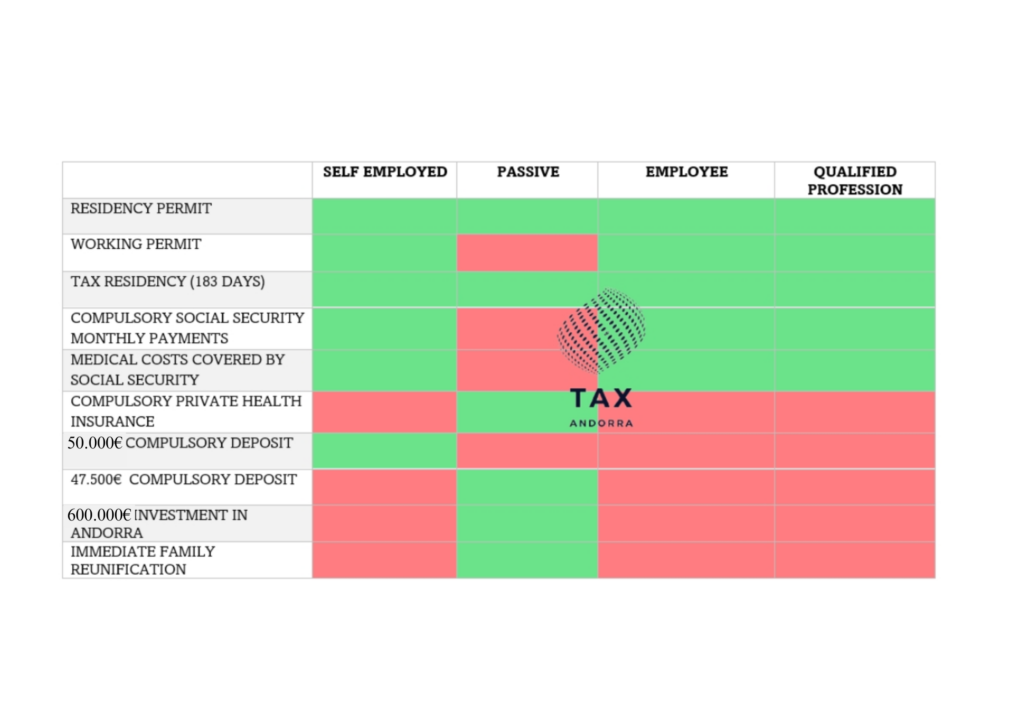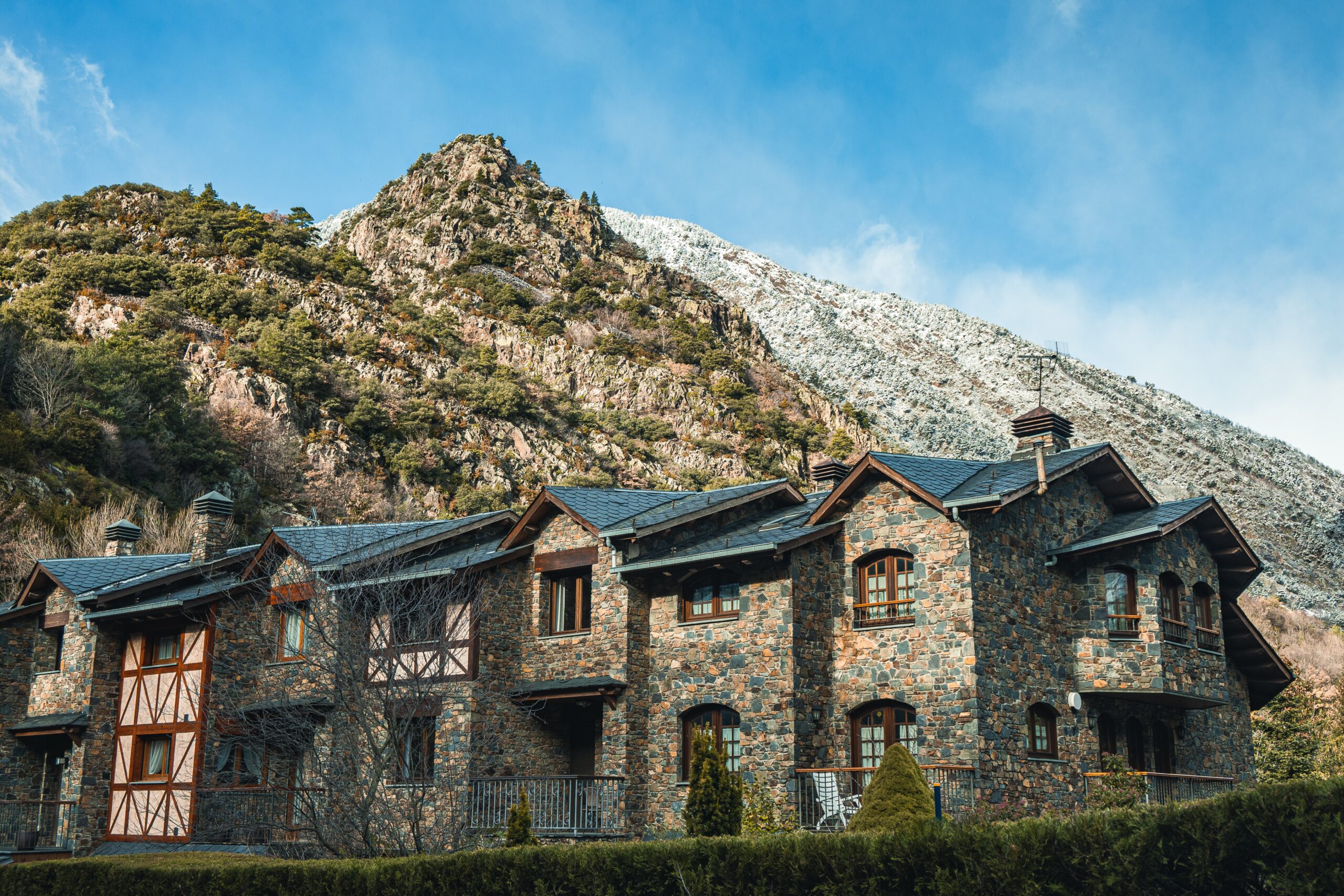Moving the tax residence to Andorra is an increasingly common practice for those who are not only looking for an optimal tax environment for their business, but also value the quality of life. Below we will present a complete and recently updated guide with the possible types of residence, as well as the times to take into account and the approximate price.
Table of Contents
Types of residence
The types of residency in Andorra can be divided into two basic categories: those that offer the possibility of working (i.e. issuing invoices and receiving a salary) and those that only allow legal residence in the Principality. All options involve obtaining tax residency in Andorra as long as the stay in the country of 183 days per year is complied with.
Residence and work:
This type of permit is divided into three subcategories:
Self-employed
Through the creation of a company. The incorporation of the company will be done in the first place and, once constituted, it will proceed to manage the processes of the immigration service to obtain the residence permit. Accessing through this route will provide the interested party with a residence and work permit on a self-employed basis only.
This should not be a problem, since the person moves as an entrepreneur, but it must be taken into account that with regard to the Andorran social security, it will only be possible to contribute as own account. In this case, if the business must be closed, the person will not be able to choose to contribute as employee, reason why it will have to process a definitive low of the country and to re-enter as employee, repeating the whole process from the beginning.
To enter as a self-employed resident (the favorite option for those people with a business), implies paying 50,000 Euros in the form of a deposit to the Andorran Financial Authority, which is recoverable in the event of leaving the country or obtaining Andorran nationality. To avoid this deposit, you can opt for the liberal professional option, which we will tell you about below. You can also be exempt from paying the deposit in case you want to apply for the nomad visa or if you qualify for the permit about digital economy.
Qualified or liberal profession
Certain profiles with completed university education (engineers, economists, doctors, architects…) can have access to residence without having to pay the 50,000 euros through the qualified profession option, which recognizes them as persons of interest to the country. This visa requires a B2 level of Catalan, the country official language.
- This option allows them to pay both self-employed and salaried contributions.
- Once the residence is obtained, it is possible to create a company or business if the person so wishes.
- It will be necessary to proceed to the registration in the corresponding Andorran college.
Employee
Being hired by a company based in Andorra, i.e. working as a salaried employee. This option does not imply having to pay the €50,000 deposit. It is worth considering that Andorra has a migration policy that favors the entry of salaried employees with a university degree or with extensive work experience in the tasks to be performed. In order to better classify the wage bill, the Andorran system works through quotas (open or closed depending on the number of unemployed people with a compatible profile) and codes, which categorize each job offer.
The codes (CNO) have seven digits and determine the qualification or work experience required to perform the functions as well as the minimum salary required according to the responsibility you will have. As an essential piece of information, depending on your nationality, you will have to keep your CNO code for a certain amount of time:
- Spanish, French and Portuguese: not applicable.
- Europeans (excluding the above nationalities): one year
- Non-EU nationals: three years
For example, let’s say you want to be a salaried employee and your nationality is Belgian. You decide to enter as a waiter, because a job offer comes up and you are hired, although you really want to work as a French teacher in a school. Well, even if you have a residence and work permit, experience and training, the Andorran immigration service will not allow you to change your CNO until your first renewal of your residence permit (after 12 months). Since the system of quotas and codes is complex, we recommend you to contact experts in the field.
Other more specific modalities may apply within this category, such as work without residence, residence for a short period of time or the possibility of working in two countries at the same time without being self-employed.
Residency: Passive residence
This is the one that allows unlimited residence in Andorra, also being able to be a tax resident, but it does not allow working, so the person in question cannot issue invoices. However, it is allowed to obtain benefits from certain incomes that do not include effective work, such as dividends, and to manage companies. You can find more information in our article dedicated to passive residences in Andorra.
Regrouping
A person can regroup his/her parents, spouse and children, as long as he/she meets different criteria that you can find in our specific article on the subject. You should keep in mind that a reunited person only has a residence permit, not a work permit, although it is possible to modify this permit if the person gets a job offer that fits his/her profile.
Comparison
If you want to get an overall idea of what each permit allows, as well as the obligations to obtain and maintain it, we believe that this comparison will help you to understand the different options:

Documents required
The documents may vary depending on the profile of the person, their type of residence and their nationality. Below we will mention some of them, although it is advisable to contact experts, who will provide you with a list of tailor-made documents:
- Apostilled criminal records from the countries of residence, nationality and birth (it is possible to avoid birth records as long as you left the country as a minor).
- Certificate of civil status (copy or original depending on your type of permit)
- Various documentation to prove the licit origin of the funds (for the incorporation of the company and bank opening).
- Documentation to prove the studies or professional experience: working life, university diploma, grades…
- Certificate of financial solvency and medical insurance with coverage in the country (for passive residences).
- Proof of domicile in Andorra (safe-conducts can be sought in case of great difficulty in finding housing).
- Receipt of the deposit, if necessary
Time to obtain residency
As a guideline and, at the expense of possible additional difficulties derived from the Andorran administration, it can be calculated that from the acceptance of the budget, the deadlines until obtaining the residence permit are:
- Work and residence permit for self-employed: 3 months (including the incorporation of the company).
- Work permit as a salaried employee: 1 week from the moment all the documentation is in place, including the address and the signed work contract.
- Qualified profession: 2 months, although the procedure can be extended depending on the difficulty to homologate the qualification.
- Passive residence: 4-8 weeks after passing the medical examination, as the documentation is examined in detail by international authorities. The review can be passed when the client has all the necessary original and apostilled documents.
It is essential to take into account that in order to become a tax resident in Andorra, it is indispensable to spend more than 183 days in the country, including during the first year of residence. For example, if the person gets the residence permit in April, the 183 days will not be on the total 365 that the year has, but on the 250 remaining in the calendar year.
Frequently asked questions:
Can I buy an apartment as a domicile in Andorra before I have a residence card?
Yes, it is possible. Depending on whether you have the residence card at the time of visiting the notary to formalize the purchase, the procedures will be more or less complex. In any case, as proof of domicile, the promises of sale or deposit are accepted, so it is not necessary to have the official notarial deed at that moment.
If I want to cancel the cancellation of the country, how complex is it to recover the deposit of 50.000€?
A verification process must be carried out with the authorities and public social services to ensure that the resident has not incurred any debt. Once these documents are available, the cancellation must be requested to the immigration service and social security. The process takes about one month if the person is not in debt with any entity.
Can I change my residence permit?
Yes, in all cases except from self-employment to salaried work, which will require a withdrawal from the country. It is also possible to change from residence and work to residence only (passive or regrouped), making the discharge to the social security and fulfilling the requirements of economic solvency and investment in the country if required.
Can I apply for residence if I have a minor offence in my criminal record?
The Andorran authorities are very demanding with the profile of new residents they accept, so the background check is a determining factor in the evaluation. However, minor offenses (for example, related to driving) may be accepted by the Andorran police, who prepare a favorable or unfavorable report when they must assess the acceptance of a new resident. This criterion applies to both holders and regrouped adults (spouses, parents and student children under 25 years of age).

